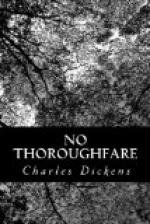“My mother at five-and-twenty,” said Mr. Wilding to himself, as his eyes enthusiastically followed the light to the portrait’s face, “I hang up here, in order that visitors may admire my mother in the bloom of her youth and beauty. My mother at fifty I hang in the seclusion of my own chamber, as a remembrance sacred to me. O! It’s you, Jarvis!”
These latter words he addressed to a clerk who had tapped at the door, and now looked in.
“Yes, sir. I merely wished to mention that it’s gone ten, sir, and that there are several females in the Counting-house.”
“Dear me!” said the wine-merchant, deepening in the pink of his complexion and whitening in the white, “are there several? So many as several? I had better begin before there are more. I’ll see them one by one, Jarvis, in the order of their arrival.”
Hastily entrenching himself in his easy-chair at the table behind a great inkstand, having first placed a chair on the other side of the table opposite his own seat, Mr. Wilding entered on his task with considerable trepidation.
He ran the gauntlet that must be run on any such occasion. There were the usual species of profoundly unsympathetic women, and the usual species of much too sympathetic women. There were buccaneering widows who came to seize him, and who griped umbrellas under their arms, as if each umbrella were he, and each griper had got him. There were towering maiden ladies who had seen better days, and who came armed with clerical testimonials to their theology, as if he were Saint Peter with his keys. There were gentle maiden ladies who came to marry him. There were professional housekeepers, like non-commissioned officers, who put him through his domestic exercise, instead of submitting themselves to catechism. There were languid invalids, to whom salary was not so much an object as the comforts of a private hospital. There were sensitive creatures who burst into tears on being addressed, and had to be restored with glasses of cold water. There were some respondents who came two together, a highly promising one and a wholly unpromising one: of whom the promising one answered all questions charmingly, until it would at last appear that she was not a candidate at all, but only the friend of the unpromising one, who had glowered in absolute silence and apparent injury.
At last, when the good wine-merchant’s simple heart was failing him, there entered an applicant quite different from all the rest. A woman, perhaps fifty, but looking younger, with a face remarkable for placid cheerfulness, and a manner no less remarkable for its quiet expression of equability of temper. Nothing in her dress could have been changed to her advantage. Nothing in the noiseless self-possession of her manner could have been changed to her advantage. Nothing could have been in better unison with both, than her voice when she answered the question: “What name shall I have the pleasure of noting down?” with the words, “My name is Sarah Goldstraw. Mrs. Goldstraw. My husband has been dead many years, and we had no family.”




